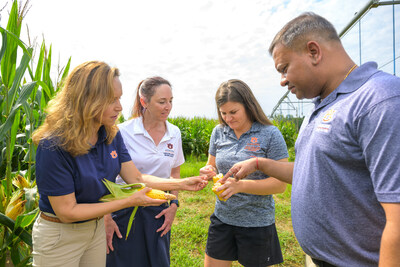Subjects: PDT, RCY, ENI
Auburn University agriculturalists shaping the future of farming in Alabama
AUBURN, Ala., Oct. 4, 2023 /PRNewswire/ -- How challenging is it to farm sustainably?
The answer is complex. While technological and scientific advancements have improved the resiliency of modern farms, there are challenges that today's farmers face in adopting conservation practices.
Enter the Alabama Cooperative Extension System, the Auburn University College of Agriculture and the Alabama Agricultural Experiment Station. A team of researchers from these entities comprise what is known as The Future of Farming Project, created to increase adoption of soil, nutrient and water conservation practices by establishing on-farm demonstrations.
It's an effort with farmers, for farmers.
"We are helping farmers adopt digital technologies and sustainable agricultural practices," said Brenda Ortiz, Alabama Extension specialist and professor in the Department of Crop, Soil and Environmental Sciences. "My responsibilities are demonstrating, evaluating and training farmers and crop consultants on how to best use digital technologies to increase crop productivity while strengthening environmental sustainability."
Ortiz's specialty is in precision irrigation. She helps farmers adopt a sustainable approach that allows the application of water to the plant at the right time and place, and in measured doses, creating optimal growing conditions. This is a win-win for the farmer: less water wasted, plus better yields.
And Ortiz represents just one part of The Future of Farming Project. She's joined by fellow Auburn faculty members and Alabama Extension specialists Audrey Gamble, Rishi Prasad and Michelle Worosz, as well as Auburn alumna and agricultural economist at Compliance Services International Leah Duzy. Together, they aim to help farmers adopt conservation practices and tackle the social or economic barriers they face.
"One challenge is the fact that conservation practices do cost money for growers to adopt and install and may increase the management time required by the grower," Duzy said. "However, for growers to invest in conservation practices such as cover crops and smart irrigation practices, they need to clearly understand the cost of the practices and the benefits that will impact their profitability across a field."
For example, growers adopting smart irrigation practices such as soil moisture sensors and variable-rate irrigation are likely to increase overall yield and profitability across the field.
And adding cover crops ? a crop planted to protect and improve soil during the seasons in which cash crops are not actively growing ? has the potential to decrease the need for irrigation through improved water holding capacity.
"Some farmers may plant cover crops with the primary goal of increasing soil moisture storage and improving drought resilience, while other farmers may plant cover crops to provide supplemental nutrients to the following cash crop," Gamble explained.
If they are fully informed on the costs and benefits of these conservation practices, growers can make decisions regarding adoption.
Prasad's focus is nutrient management, which he calls "an art as well as a science." He helps farmers practice the 4R principles: the right rate of nutrients, at the right time, with the right source and the right method of application.
"Managing nutrients sustainably in Alabama farms will ensure that farmers have a profitable crop harvest and have fewer nutrient losses to the environment," he said. "Fertilizers are expensive, and losing them means losing money and, at the same time, contributing to environmental issues such as polluting freshwater bodies or emitting greenhouse gases."
These experts partnered with Posey Farms in North Alabama, L.C. Farms in South Alabama and Lazenby Farms in Central Alabama to provide regional on-site demonstrations, allowing Alabama farmers to learn in person from both the researchers and from their peers.
Mitch Lazenby of Lazenby Farms hosted one of these on-site demonstrations over the summer. He shared his story of adopting conservation practices over the last 25 years.
"We are seeing how we can close up our gaps," he said. "How can we get seed to soil with more cover, tighter and closer, with more biomass? There are so many nuances to these conservation practices, you really can pick any one of them and begin."
To read more about The Future of Farming Project, visit the College of Agriculture website.
SOURCE Auburn University
These press releases may also interest you
|
News published on and distributed by:





